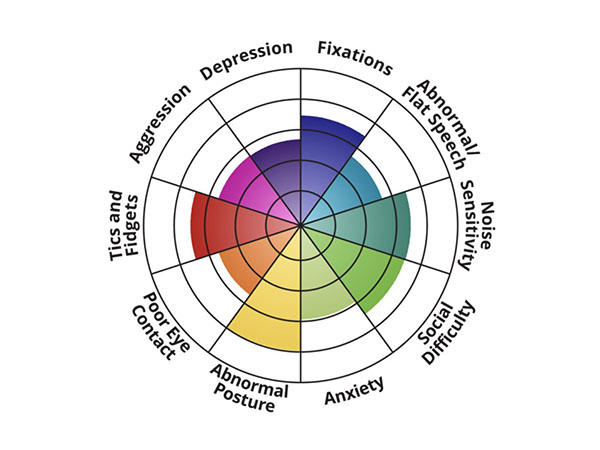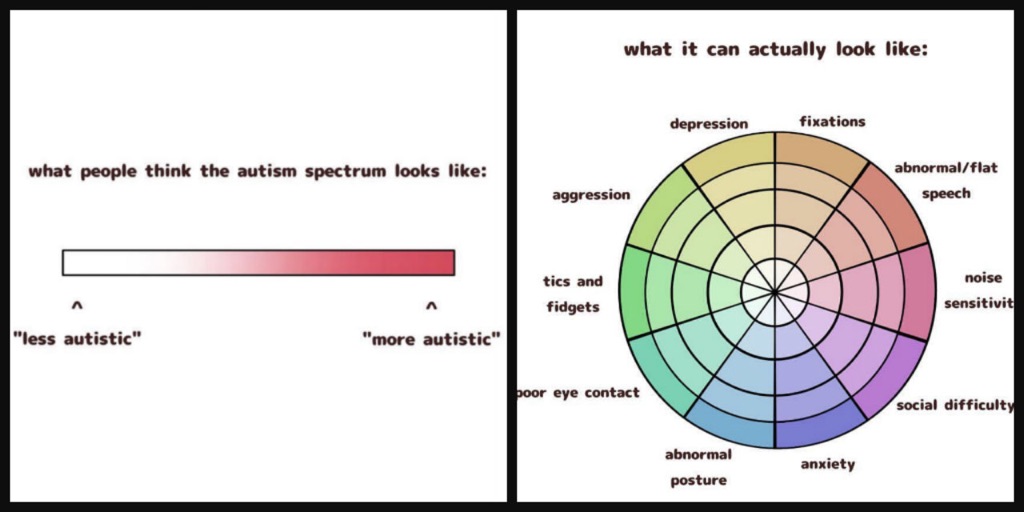Defining Autism
Take a moment and think about what your mental images and understanding are of the word “autism”. Just take a moment and visualize what autism is.
On a very basic level, autism is short for Autism Spectrum Disorder or ASD. People who are autistic have a different brain structure than those who aren’t autistic. On scans, an autistic individual’s brain actually looks different than a non-autistic person’s. The edges are smoother; their brains are more symmetrical; and certain parts are a different size. Our kids are born this way. They are autistic from the moment they enter this world. While autism research is ongoing, it is thought to be mainly genetic and some research shows that it comes from the father’s genes. Click here for a link to a study from Johns Hopkins. Click here for a link from a study reported in Science.org.
Spectrum vs. Wheel
This difference in the brain composition has an effect on the way the brain grows and changes. All brains are very different and that is partly why the autism spectrum is so wide! In fact, many people don’t call it a spectrum anymore, instead, they think of it like a wheel. There might be people who don’t “seem” autistic at all, we call them low-support needs. There might be people who cannot form words or who lack the ability to make their bodies feel calm along with many other behaviors not seen as “typical”. We call these people high-support needs.
Neurodivergent?
Now some of you may hear the terms neurodivergent or neurotypical. I want to make sure you understand what that means. An autistic person is considered neurodivergent, however, they are not the only people in this category! ADD, ADHD, OCD, Dyslexia, and many other disabilities are also a part of this large term of “neurodivergent”. Actually, people with ADD or ADHD have brain scans that look very similar to an Autistic brain! So cool right? Neurotypical is anyone else who is not neurodivergent.

Autism’s Effects
Another important thing to understand is that autism affects the five senses; touch, taste, sound, sight, and smell. Some people might be more sensitive to sound to the point where sounds that don’t seem very loud actually hurt them. Some people won’t be able to handle certain textures of food to the point that the feeling makes them sick. Some hate fluorescent lights or sunshine because the brightness hurts their eyes. Many autistic people have a need to get away from the stimuli, and some might crave more stimuli.
Sensory Processing Disorder
With Sensory Processing Disorder, autistic people’s brains do not understand the senses like typical brains do and send different signals when they come into contact with them. This is a very important part of autism because it can cause other behaviors to worsen or make it so they cannot function. Think about if you heard a sound so loud it hurt your ears. What would you do? Cover your ears? Would you cry? Would you be able to have a conversation? Now imagine if you went through life constantly hearing a sound that hurt your ears. These moments happen to this group of people all the time.
Developmental Delay
Overall, Autism is viewed and understood as a developmental delay. So what is that? Well, you might see an autistic 5-year-old still acting in ways a 2-year-old would because their development is delayed. Some people with autism might not speak until they are 10 or older, because their brain development is different. Some babies don’t walk until they are older than the usual toddler. Many autistic individuals have a delay in fine motor skills, like writing and cutting with scissors. Sometimes they are only delayed in some areas, and sometimes they are behind in development overall.
Not Yet
To be clear, delay does not mean impaired. It does not mean they won’t ever write their names or speak, it just means they are not able to yet. Autistic people are incredibly smart and capable; they just interact with the world around them in a very different way. The way their brain functions makes it hard to live in this world with it being so fast-paced. Kids need to read by first grade, but they might still be working on holding a pencil or their brains might still be trying to make connections to talk. This difference causes many people to view them as being mentally disabled, also known as cognitively impaired. It is important to remember that they are not unable to do these things, they just can’t do them yet and they understand the things being said about them.
Understanding
I hope this has helped you understand the world of autism a little bit more. Those of us who live with autism in our families like to use big words and dive into explanations that often don’t make sense to most people so I also hope this gives you the words to explain autism to others!

Story by Jackie Davidson for BlueWaterParent.com
All content of BlueWaterParent.com is for informational and entertainment purposes only and does not constitute medical advice.

